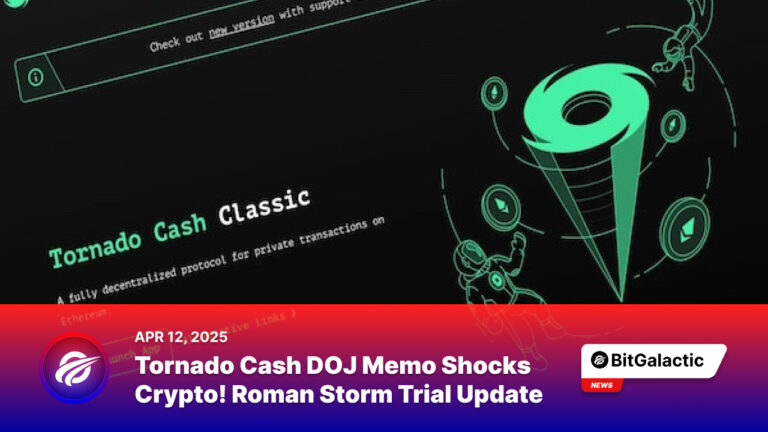Tornado Cash DOJ Memo Shocks Crypto! Roman Storm Trial Update
Yo, crypto fam! What if I told you the U.S. Department of Justice just dropped a bombshell that could shake up the entire crypto privacy game? Tornado Cash’s Roman Storm might’ve just caught a lifeline from the feds themselves. Stick around, because I’m diving deep into what this means for crypto mixers, your privacy, and the future of DeFi. Let’s go!
Alright, let’s break this down. I’m Jake from BitGalactic, and after a decade in crypto, I’ve seen plenty of plot twists, but this one’s wild. The DOJ put out a memo this week saying they’re hitting pause on prosecuting crypto mixers for stuff their users do without the developers knowing. Translation? If you’re building a tool like Tornado Cash and some bad actors use it, the feds might not come knocking… as long as you’re not in on the scheme.
This is huge for Roman Storm, one of Tornado Cash’s co-founders, who’s been staring down a trial since 2023 for allegedly helping launder $1 billion. The DOJ’s memo doesn’t clear him outright—they’re still saying he might’ve known about shady money flowing through—but it’s a shift. Bill Hughes, a former DOJ guy and now MetaMask’s legal head, called it a win for Storm’s team. And I agree.
Here’s my take: this memo feels like the government admitting they’ve been swinging too hard at crypto. Tornado Cash isn’t a company holding your funds—it’s code. Open-source, decentralized code. Punishing devs for how others use it is like blaming a carmaker for a bank robbery getaway. The DOJ’s pivot shows they’re starting to get it.
Now, let’s zoom out. Privacy coins and mixers like Tornado Cash have been under fire forever, but they’re not going anywhere. According to CoinMarketCap, privacy-focused tokens like Monero and Zcash have seen a 15% market cap bump in 2025 alone, even with all the regulatory noise. Why? Because people want control over their financial data. Period.
The DOJ’s memo isn’t just about Storm—it’s a signal. Crypto’s too big to bully now. TRM Labs says $45 billion in illicit funds moved through crypto in 2024, but that’s a drop in the bucket compared to traditional finance. The feds are realizing they can’t shut down innovation to catch a few hackers.
This isn’t the first time we’ve seen this dance. Remember Silk Road? Back in 2013, the feds took down the dark web’s biggest marketplace and threw the book at Ross Ulbricht. Crypto got painted as the bad guy then, too. Same with Mt. Gox in 2014—hacks and scams made headlines, and regulators swore they’d crack down.
But here’s the thing: every time the government tries to choke crypto, it adapts. Bitcoin survived Silk Road. Ethereum survived Mt. Gox. And now, privacy tech like Tornado Cash is weathering this storm. Last November, a U.S. appeals court even slapped down the Treasury for overreaching when they tried sanctioning Tornado Cash’s smart contracts. That’s not just a win for Storm—it’s a win for every coder building decentralized tech.
So, what’s next? My prediction: this DOJ memo is the start of a thaw. With the Trump administration leaning pro-crypto—David Sacks as crypto czar, SEC backing off Binance and Coinbase—it’s clear the U.S. wants to play ball, not burn the field down. I think we’ll see more clarity for devs by 2026, maybe even safe harbors for open-source projects.
But there’s a catch. The DOJ’s still going after anyone they think knows their tech’s being used for crime. For Storm, his trial in July 2025 is gonna hinge on what he knew about North Korean hackers. If his team can prove he had no control over the protocol—and let’s be real, Tornado Cash’s smart contracts are immutable—then he’s got a shot.
Alright, fam, I wanna hear from you. Should devs like Roman Storm be held liable for what users do with their code? Or is this just the government scapegoating crypto again? Drop your thoughts in the comments, and let’s keep this convo going. Oh, and if you’re into privacy coins, which one’s your pick for 2025—Monero, Zcash, or something else? Hit me up!
That’s it for today, crypto fam. If you vibed with this breakdown, smash that like button and hit subscribe to BitGalactic for more no-BS crypto takes. We’re dropping videos every week to keep you ahead of the game. Follow me on X for real-time updates, and let’s keep building the future of finance together. Peace out!
Share this post


